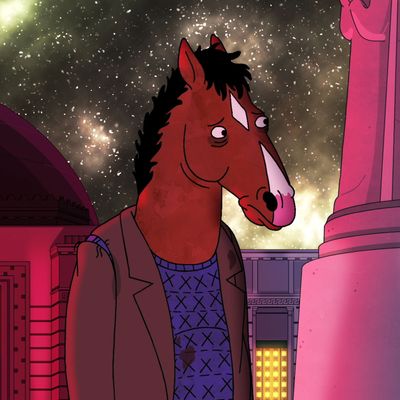
The sixth and final season of BoJack Horseman finds the troubled equine/human exactly where we left him in season five: checking into rehab in an attempt to kick his alcoholism for good. Addiction, a subject that has been central to the entire series, factors into the first eight episodes, or part one, of season six, which debuts on Netflix October 25. (The second part of the season will arrive in January.) But the more important theme that runs through this penultimate chapter is the idea of overcoming self-involvement and evolving into someone who takes care of others.
In one blunt, hilarious illustration of that idea, BoJack (voiced with gravelly sarcasm by Will Arnett) shows up at Princess Carolyn’s house with a gift for her new infant daughter, Ruthie: a portrait of BoJack staring at an image of himself swimming in a pool. “Look what Uncle BoJack brought you, Ruthie,” Princess Carolyn (Amy Sedaris) announces wryly. “It’s a 1970s pop-art interpretation of the Narcissus myth. How appropriate for a baby.”
“Narcissus?” BoJack says. “I thought the painting was about me.”
Let’s say BoJack is still working on his capacity to put others ahead of his own interests. But over the course of these new episodes, which are funny, astute, and well-written, if not as experimental as some of the show’s standout installments, BoJack actually does begin to make progress in the right direction. He’s also not the only character learning to open themselves up more fully to others. Diane (Alison Brie), BoJack’s closest friend, enters a romantic relationship with someone who truly values her, forcing her to reconsider her future on multiple fronts. Princess Carolyn tries to juggle the demands of work with raising an infant, an exhausting effort that makes her feel like she’s gliding through life as a ghost of her former self, a concept reflected in the imaginative animation of the second episode. Even Todd (Aaron Paul), usually an island unto himself, is finding that caring for Ruthie is especially rewarding.
If that makes BoJack Horseman sound like it’s getting a bit too warm and fuzzy, don’t worry: Its comedic edges remain as pronounced and sharp as ever. As the show starts down the road to its ultimate finale, it’s going back to its roots in certain ways. Yes, it still explores depression and contains moments of drama and poignancy, but this batch of episodes feels more explicitly comedic than the previous couple of seasons. In particular, showrunner Raphael Bob-Waksberg and his team get more juice out of the type of entertainment-industry satire that originally defined the series. Which makes sense given the themes about becoming a more generous, less self-absorbed individual. There is no place harder to accomplish that task than Hollywood — or Hollywoo, as it’s known in BoJack land — a city that boasts the highest number of narcissists per square mile.
All aspects of the pop-culture-production complex are open for mockery. Jabs both subtle and blatant are taken at, among other things, This Is Us, influencer culture, corporate consolidation, Ferris Bueller’s Day Off, and Michael Bay. (Make sure you’re doing your required BoJack Horseman Easter egg reading for that last one.) There’a joke that manages to incorporate Kevin Spacey, Bryan Singer, and Andy Dick into the same sentence, a riff on the movie Up in the Air, and a jagged zinger at the expense of the director of Silver Linings Playbook. (BoJack, upon hearing a baby crying while he’s talking to Princess Carolyn on the phone: “I can tell I’m interrupting your meeting with David O. Russell, so I’ll make this quick.”) There is even a story line that involves all of the assistants in town staging a walkout in an attempt to receive better wages and treatment, an echo of something that’s actually brewing in the real Hollywood right now. (During negotiations, when an assistant representative is asked want she and her colleagues want, she says: “We’d like to not be treated like garbage.” “I’m afraid we’re at an impasse,” responds producer Lenny Turteltaub, voiced by J.K. Simmons.)
These eight episodes also resuscitate events and moments from previous seasons that have continued to haunt BoJack, including the death of his Horsin’ Around co-star Sarah Lynn (Kristen Schaal) and his encounter with Penny (Ilana Glazer), the teenage daughter of his former girlfriend Charlotte (Olivia Wilde) back in season two. Just when it seems like BoJack is clearly headed toward happier times, a bombshell is dropped at the end of the eighth episode that guarantees that there will be plenty for the famous horse to sort through when part two arrives in January.
In the meantime, we’ve got eight more episodes of one of the best shows of this decade to savor. BoJack Horseman, six seasons in, is more clever, intelligent, and multilayered than 95 percent of comedies on television or any other platform. Its protagonist and other principal characters may still be in need of self-improvement, but the show in which they appear remains about as good as it gets.





